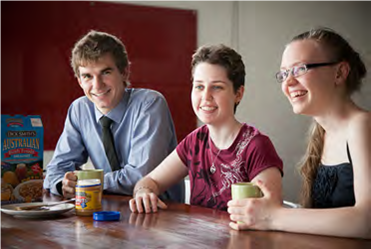Ashley's story

Meet Ashley Allum. Ashley is 26 years old. She has a Mum, a Dad, and an older brother. She has a favourite colour, a favourite movie, a Facebook account, childhood toys, memories of family holidays, old school report cards, and brimming photo albums. She has a favourite book, favourite pair of shoes, best friend, a vote in the Federal election, posters in her room and hidden talents. These are some of the things that define Ashley Allum. This should be enough to answer the question “Who is Ashley Allum?” It should be enough. However, Ashley has a particularly severe form of gastroparesis. At 26 years old, she already feels as if her life is over.
Western Sydney resident Ashley Allum woke up after recovering from the flu 18 months ago to find that the feeling in her stomach had changed. Ashley experiences constant daily nausea and vomiting and feels full after only eating very small amounts of food. She was diagnosed with a debilitating condition called gastroparesis, which means "paralysed stomach".
For Ashley, gastroparesis is a defining illness. Considering its farreaching influence over almost all aspects of her life, it can hardly be disputed. At the time of her diagnosis two years ago, Ashley was happily working at a real estate agency. She enjoyed going out with her friends on weekends. She had her own dreams and ambitions. Life was the way she had always thought it should be. As with all young women, the world lay at Ashley’s feet. Speaking to Ashley now, it is clear that while her strength and hope remains, there is increasingly little left for her to dream about in the future. Just that maybe one morning she will wake up and not be sick.
The one thing I really want is to manage my gastroparesis so I can go back to work and sustain some sort of normality. Once we figure out how to fix it … it will be golden – Ashley
Since her diagnosis, Ashley has been forced to leave her job at the real estate agency because the pain she suffers from on a daily basis became too overwhelming. By necessity she lives at home with her parents. Just like that, any future job opportunity or chance for financial independence disappeared. For expensive treatments, from symptomatic to experimental or unorthodox, Ashley relies on her limited savings account and help from her parents. Her desire for Medicare to recognize gastroparesis as the life altering, disabling condition still burns strong. When she feels up to it, Ashley still tries to go out with her friends to parties and dinners, but is hampered by the fact that her dietary restrictions can’t just be left at home for the night. While she says she is lucky to have such understanding friends, Ashley knows it is difficult for them and anyone else to really see the full extent of her illness. For Ashley, her conscious engagement in the mere act of eating a meal doesn’t end at the point of swallowing. She is painfully aware of the process that follows. Painfully aware of her stomach’s inability to handle food in the same way as her family, her friends, her neighbours.

Painfully aware of the nausea and abdominal cramps that follow every bite. It is this lack of community awareness and knowledge about gastroparesis that makes empathising with Ashley’s situation so hard. To give some perspective – Ashley also suffers from cerebral palsy. However, when she talks about how at 26 she feels like she has been robbed of the chance to really live her life, this hardly gets a mention.
Even after all the failed treatments and negative results, Ashley has remained hopeful, thanks largely to the dedicated work and effort of Dr Vincent Ho, Clinical Gastroenterologist Academic and Director of the Gastroenterology Research Team, School of Medicine, University of Western Sydney. The new GI Motility Research Program at the University of Western Sydney School of Medicine, led by Dr Vincent Ho, is dedicated to understanding the cause of gastrointestinal motility disorders such as gastroparesis through both laboratory-based and clinical research.
Dr Ho and his team are focused on making a real difference to patients, like Ashley, by translating discoveries in the laboratory to meaningful and effective clinical applications.
As part of their medicine in context project, medical students Michael and Janene spoke with Ashley and constructed this empathy story describing what its like to live with gastroparesis through Ashley's eyes.

 GP Home
GP Home
